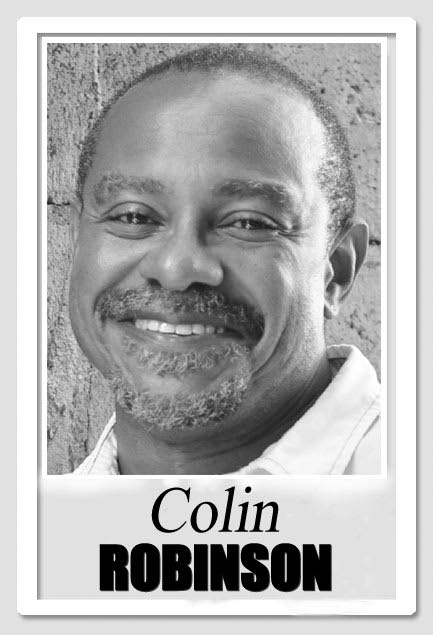Our hard-headedness

I was reading my poem and Miss called me,” 11-year-old Kadell told Newsday in March last year. Then, the Brighton, La Brea primary-schooler and aspiring footballer said, “she grabbed my neck and held me down and cut my hair.” The teacher had decided the young man’s hair was not “combed” to her liking.
“Trim him low, Mr Fitzie, my mother breathes, her voice insistent, in it, more than a declaration of her will, an edge of — but, I must say it — spite.”
Reading Earl Lovelace’s poignant line in A Brief Conversion, I instantly recognised in Pearl and Travey my own childhood “sitting wedged between my mother’s knees, the fine-toothed comb firmly anchored in my ample knotted mop, she tugs once, twice again, and mutters from beneath her fraying wig: You have you father hard head.”
Those words, with their layers of Afro-Saxonness and Caribbean gender relations, so name my childhood that I chose them as title for a poetry collection in which much of what I do is explore Caribbean sonhood. Perhaps Kadell, too, will grow up to be a poet.
I understand this ritual of matrilineal violence that disappointed Afro-Caribbean women enact on the heads of their child fathers’ boy-children so incisively. Even how female teachers take on this maternal role of disciplining their male charges’ coiffure that has run as perilously as predictably astray.
But man-children are not the only victims of our culture’s well-worn tonsorial abuse. Colonialism and plantation have arguably done a worse number on girls’ Black scalps, their scars and sores telling stories of hot combs and lye, tight weaves and vigorous exfoliation.
Boys’ heads are places to punish the remorse of masculine pleasure; girls’ ones to implant the humiliation of feminine respectability.
In this week’s headlines, Leiselle Morton-Taylor’s 15-year-old’s nappy head joined the long line of schoolgirls’ hazed by the hair by institutions appointed to grow them. Another Black family’s taste in hairstyle has become the obsession of an educational gatekeeper. Newsday reports the mother’s account that a Princes Town principal put her hands into her daughter’s hair, lamenting, “So your mother couldn’t comb your hair better than that.”
It’s not only minors’ scalps we police, though. Three years ago many faithful Colfire customers vowed to change insurers when a photograph of its recipient appeared briefly on social media alongside a letter from the company’s human resources department threatening him with discipline for his “unprofessional hairstyle.”
I grew up with the comb as an instrument of torture and self-hate. “Sole man in a house of three generations of women,” I had the tightest helical coils for hair, in which were invested all the shame and regret of my absent father’s Afro-Grenadianness. The goal drummed into me between my mother’s knees was to undertake the responsibility to comb it into respectability. And I took to various pomades and lubricants and toothed implements to achieve this dragging. The outcome was far less anything which combing accomplished than it was to have simply got the comb to go through. To have “combed” your hair.
Ironically, like Travey, the simple low trim that would enable practical management of my African tresses took on instead all these deeply gendered meanings of maternal domination, like a rite of public mortification of the hair. The back-to-school haircut fell in line with other routine childhood violences like castor-oil and senna worming.
Gay men are developing a narrative of the toxic masculinity embedded in the barbershop, how it is a place of ignominy we have never felt safe. It wasn’t just my mom’s knees at home; I felt the embarrassment of my fatherlessness in every barbershop visit. Last month, my straight “son” and I set out for Southeast Washington DC to an art installation by Trini-American Devan Shimoyama that reinvented the barbershop space. Waiting for ours, we watched mainly women from the gentrifying, once Black working-class neighbourhood come through, many with more than one boy in tow, for the free haircuts administered in a florally adorned trailer, some by a trans man.
Caribbean masculinity may be my own lens onto this hair thing, but the much bigger picture Leiselle’s daughter raises is why does Black hair trouble us so particularly? More than black skin. We have similar disquiet, for sure, with hair in other places: beards, pubes, underarms.
But a signal measure of our post-coloniality — or as our Prime Minister tied to our republicanhood this week, achieving “a kinder society, in which we respect each other and ourselves” — ought to be our capacity to leave children’s African heads alone and get on with the business of making them healthy adults. As I wrote about QRC in January, so much of what we think achieves that is misplaced, wrong-headed, and contrary to evidence. And when our children’s heads fall victim to this nonsense, there’s another Mr Fitzie, the parliamentary dread, I eagerly want to hear from.


Comments
"Our hard-headedness"